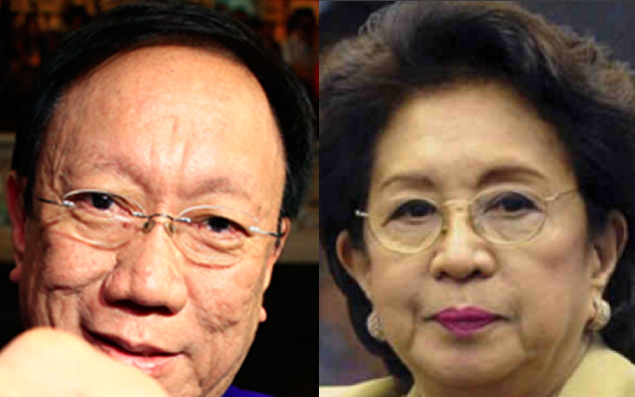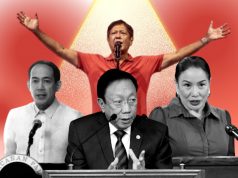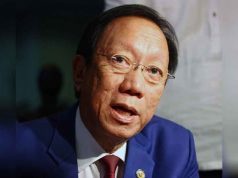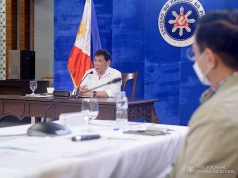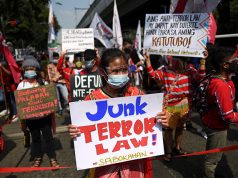MANILA, Philippines — Claiming Ombudsman Conchita Carpio Morales’ refusal to comply with a Malacañang order to suspend Deputy Ombudsman Melchor Carandang had created a “legal and ethical vacuum,” Solicitor General Jose Calida suggested “an obvious solution to the seeming impasse” — her impeachment.
“There is an obvious solution to the seeming impasse,” Calida said in a statement on Friday, February 2. “Section 2, Article XI of the Constitution states, ‘The President, the Vice-President, the Members of the Supreme Court, the Members of the Constitutional Commissions, and the Ombudsman may be removed from office, on impeachment for, and conviction of, culpable violation of the Constitution, treason, bribery, graft and corruption, other high crimes, or betrayal of public trust. All other public officers and employees may be removed from office as provided by law, but not by impeachment’.”
He said the law referred to in the last sentence of Section 2 is the 1987 Administrative Code, “which states in Section 20, Chapter 7, Title 1, Book III:
Sec. 20. Residual Powers. — Unless Congress provides otherwise, the President shall exercise such other powers and functions vested in the President which are provided for under the laws and which are not specifically enumerated above, or which are not delegated by the President in accordance with law.”
Calida also claimed Morales could not invoke the Supreme Court ruling in Gonzales III vs. Office of the President (G.R. 196231), which declared unconstitutional Section 8(2) of Republic Act No. 6770 or the Ombudsman Act of 1989, which gave the president disciplinary authority over the deputy ombudsman.
The high court noted that this authority would “seriously place at risk the … independence of the Office of the Ombudsman itself.”
Calida noted that Morales was supposed to investigate Duterte for supposed undeclared bank accounts but “recused herself and passed the baton to ODO Carandang to do this task.”
Carandang then “bungled his job by exposing the President’s fake bank accounts.”
Executive Secretary Salavador Medialdea’s order for the 90-day suspension of Carandang cited grave misconduct and grave dishonesty for misuse and revelation of confidential and false information on a complaint filed by lawyers Manolito Luna and Elijio Mallari, who accused the deputy Ombudsman of “falsely and maliciously claiming” that the Anti-Money Laundering Council had released a report on Duterte’s bank deposits.
Morales called the order “patently unconstitutional.”
For his part, Albay Representative Edcel Lagman issued a reminder that President Duterte is mandated to protect and uphold the laws of the land, including the Supreme Court decision stating the President has no disciplinary authority over the deputies of the Ombudsman.
Lagman’s pronouncement came as Malacañang Spokesman Harry Roque insisted that the suspension order on Overall Deputy Ombudsman Melchor Arthur Carandang would be carried out unless stopped by the Supreme Court.
Lagman argued that the Office of the President is “grossly mistaken” by basing the suspension of Carandang on a “mere conjecture or vain hope” that the Supreme Court will reverse the decision in the Gonzales case, where it was ruled that the President has no disciplinary authority over the deputies of the Ombudsman.
“The decisions of the Supreme Court are part of the law of the land, which the President is sworn to protect and uphold,” Lagman said.
“The prevailing jurisprudence, law and constitutional provision do not empower the President to dismiss, suspend, or impose disciplinary sanctions against the Ombudsman’s deputies,” the opposition lawmaker said.
In the Gonzales case, the Supreme Court emphasized that “subjecting the Deputy Ombudsman to discipline and removal by the President, whose own alter egos and officials in the Executive Department are subject to the Ombudsman’s disciplinary authority, cannot but seriously place at risk the independence of the Office of the Ombudsman itself.”
Calida claimed Morales, in refusing to carry out Carandang’s suspension, “sanctimoniously invoked a distorted interpretation of the Ombudsman’s independence to shield her office from accountability. This is a travesty of justice.”
Explaining the “legal and ethical vacuum” Morales supposedly created, Calida said she “cannot also discipline the ODO for acts committed in a case where she inhibited herself as she will contradict herself. Neither can the ODO be disciplined by the other Deputy Ombudsmen due to lack of legal basis.”
“This legal and ethical vacuum was not contemplated by the Supreme Court’s 2014 Gonzales decision,” he added.
He said Duterte “was forced to exercise his residual authority to discipline officials under the Executive Department. Besides, preventive suspension is not a penalty, which further differentiates this case from the Gonzales ruling.”
Thus, the order suspending Carandang “merely filled the vacuum left by the Ombudsman’s masquerade, and enforced accountability in public service. Otherwise, we will just be paying lip service to the constitutional precept that public officers shall remain accountable at all times.”
READ SOLICITOR GENERAL JOSE CALIDA’S STATEMENT:

